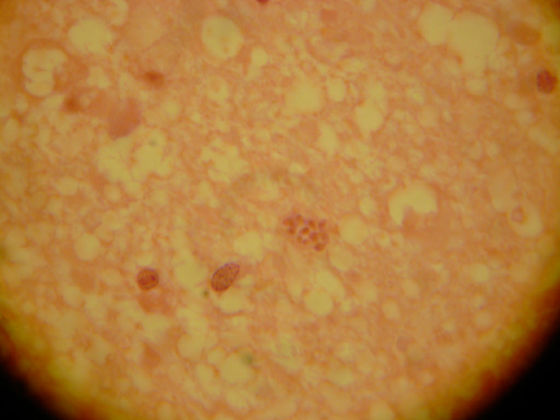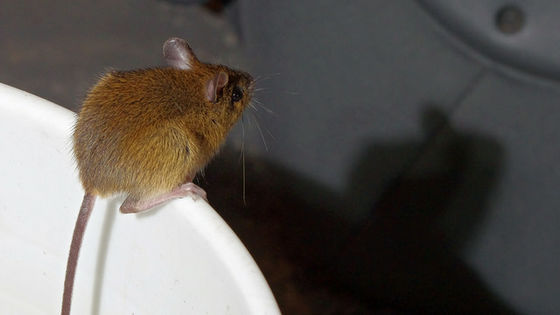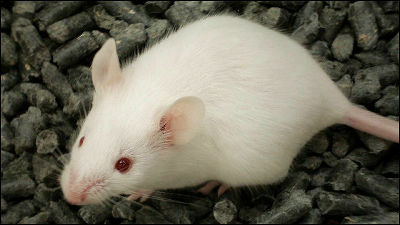It turns out that parasitic parasitic on human body also distorts the behavior and personality of the host

ByBart
A terrifying parasite that parasitizes the brains of living creatures, such as mice, cats, and humans, that distorts host actions and harms health, is "Toxoplasma"is. Gustavo Alisabaraga and Bill Sullivan, professors at the Indiana University Medical School, reveal what sort of living things and how they affect them.
Common Parasite Could Manipulate Our Behavior - Scientific American
http://www.scientificamerican.com/article/common-parasite-could-manipulate-our-behavior/

Mice have a fundamental fear against cats. This is a sensation to protect rats from "death", but unfortunately there is another terrible enemy in the rat. It is a single cell organism's "Toxoplasma"This is a terrifying parasite that will not feel the" fear of the cat "which is the most fundamental survival instinct of parasitic rats.
Toxoplasma infests not only mice, but also parasitic on every homeothermic animal such as land, sea and sky, and of course also humans. According to scientists, there are some 3 billion people who are infested with Toxoplasma worldwide.
It is said that one in five people is infested with Toxoplasma in the United States, and there are places where the parasite rate reaches 95% in some countries. However, for most people, it is also clear that no symptoms will appear even if infected with Toxoplasma. However, recent research has revealed that Toxoplasma remodels the molecular structure in the brain of homeothermic animals, and among researchers Toxoplasma has the effect of distorting human health status and personality , There are also people who advocate.

ByBart
◆ What is Toxoplasma?
Scientists first discovered Toxoplasma in 1908 and by the end of the 20th century various information on this parasite has been found. The reason has not been revealed yet, but Toxoplasma gets propagated only in the intestines of the host cat, and for Toxoplasma catsFinal host. The main infection route of Toxoplasma is oral infection, but humans seems to be infected with this parasite often when dealing with toilets for cats and cat food and drink.
Toxoplasmas breed throughout the body in asexual reproduction among other hosts. In the early stages of infectionToxoplasmosisIt can cause severe tissue damage in the case of immunodeficiency. However, in most cases, it is suppressed by the immune system, it does not become a big problem, it is attacked by symptoms such as discomfort, cold, fever, whole body pain, and the activity by the immune system within several days Is suppressed.
However, if it first infects Toxoplasma at the initial stage of pregnancy, Toxoplasma infects even the growing fetus, possibly causing severe damage to the fetus or abortion in the worst case .

ByMichael Wunderli
Since the initial infection, Toxoplasmus is in the body of the hostCystAlthough it does not express any symptoms in particular, it seems that there are times when you are suffering from serious complications in the case of a person receiving AIDS, organ transplantation, chemotherapy etc. However, after hiding in the body for a while, we weaken the organism's immune system and form an environment that is easy to reproduce in the host body. So, once infected with Toxoplasma, you will spend your life with this parasite in your body.
◆ Toxoplasma screws mouse behavior
In the 1980's, researchers noticed an abnormal behavior that rats infected with Toxoplasma became extremely active, and almost no grooming was done. And in 1994, an epidemiologist at Oxford University Dr. Joann Webster discovered that rats with cysts in their body unlike rats do not try to escape from the cat and approach to the contrary .
Dr. Webster conducted a survey on this "phenomenon that the mouse sneaks on the cat", which is not that the Toxoplasmus parasitic in the rat's body moves into the body of the ending host cat, it is not manipulating the mouse I guessed it. From several subsequent studies, toxoplasmosis was induced by neural action andGene expressionIt has turned out to change the behavior of the mouse by.
In one experiment, we investigate the reaction by killing the cat's odor to rats infected with Toxoplasma and uninfected rats. In this experiment, rats not infected with Toxoplasma started to watch the surroundings, but infected rats did not show any caution. In addition, research conducted at Stanford University in 2011 also reveals that mice infected with Toxoplasma are sexually excited and attracted to the cat's odor.

ByColoneljohnbritt
In the mammalian brain there are parts parallel to the neuronal pathway that govern "defense" and "reproductive". The neuronal pathwayOlfactory bulbStarting fromCerebral limbic system, But when we dissected the rat's brain, it turned out that the cysts around the limbic system around the cerebral limbic system are much more numerous than the rats not infected, when individuals infected with Toxoplasma were found. Furthermore, when observing the reaction of the brain when a mouse infected with Toxoplasma sniffs the odor of cat, we observed that the pathway concerning the "reproductive" of neurons showed the same response as smelling the female odor It is obvious.
These results suggest that the neural action of rats infected with Toxoplasma is switched from "defense" to "reproductive". In other words, we misunderstand the odor that normal rats feel danger as female scents. In addition, other studies have also revealed that Toxoplasma increases the level of neurotransmitter production related to host sexual behavior, stopping the increase in this substance, the rat infected with Toxoplasma gets lost by the scent of the cat and cat The result of research that the strange phenomenon of approaching to you also ceases to occur also has been published.

ByMelissa Wiese
According to Professor John C. Boothroid, a parasitologist working at Stanford University, Toxoplasma first attaches to the host cell and then injects the accumulated foreign protein into the cell and enters the host cell to enter the mitochondria It is said that it will remodel the host protein so as to inhibit the expression of host genes in the intracellular DNA, or to prohibit the immune reaction so that Toxoplasma is easy to reproduce.
In addition, when a mutant species of Toxoplasma was infested in a mouse, a phenomenon in which infected rats sneaked in the scent of cats once was seen despite the absence of detectable parasites in the brain after 4 months It seems likely that the behavioral change brought to the host by Toxoplasma may be permanent even when the parasite is absent.
◆ Toxoplasma and humans
Being altered by Toxoplasmosis is likely to focus particularly on rodents such as mice, so that people infected with Toxoplasma do not jump into the zoo Lion cages. Because it is almost impossible for humans to eat in cats, humans are like "dead ends" for Toxoplasma. Still, if it infects Toxoplasma, it seems that cysts will accumulate in the human brain and take unexpected behaviors.
Mr. Yaroslav Flegre, a parasitic biologist at Charles University in Prague, Czech Republic, conducts a massive survey to continue character evaluation of 2,500 subjects for over 10 years. According to the results of this survey, the behavior of humans infected with Toxoplasma often seems to have the same characteristics. For example, men infected with Toxoplasma are introverted, suspicious, rebellious. In women, there are many people who are reliable and obedient. Furthermore, when we performed a test to measure simple reaction time, people infected with Toxoplasma also had a slower reaction time than people of the same age who were not infected.

ByZen Sutherland
In addition, in a survey conducted in 3890 recruits in Czech Republic in 2009, a soldier with a negative blood type infected with Toxoplasma was infected with 6 of 6 unaffected positive blood group soldiers It has become apparent that twice as many traffic accidents had occurred. It is not clear how negative blood type, that is, the presence or absence of RhD protein relates to Toxoplasma to increase the incidence of traffic accidents, but it is clear that these are working somewhat.
In addition, it is also clear that humans respond to cats' odor as well as mice. In a survey conducted in 2011, 34 students who were infected with Toxoplasmodium and 134 uninfected students smelled urine samples from various animals, and men infected with Toxoplasma got infected It has been revealed that it showed a favorable reaction to odor of urine of cat far more than men who did not. However, in the case of women, the opposite reaction seems to appear, and it is the same as the result of Mr. Flegre's personality survey to have different characteristics between men and women.
Another potential connection between toxoplasmosis and schizophrenia is also pointed out.Stanley Medical Research InstituteAccording to a survey by Mr. E. Fuller Torrey, a psychiatrist and Robert Jorken of Johns Hopkins University, among the patients who first developed schizophrenia, the number of people infected with Toxoplasma It seems to be very large. However, since schizophrenia develops from various factors, it can not be concluded that schizophrenia has developed by Toxoplasma. Moreover, there is still a lack of information on whether Toxoplasmas cause all kinds of psychosis including schizophrenia.
Incidentally,America Disease Control CenterIn order to prevent infection by Toxoplasma, keeping the cleanliness, such as by washing your hands during cooking, and gloves and masks if you have a garden where cats are freely coming and going, gardening I recommend that you do.
Just because you are parasitic on Toxoplasmas you do not get superhuman power, tears cease to emerge and your right hand is not going to be a partner, so to reduce the possibility of infection even a little basic basic such as gargle It seems to be good not to neglect infectious disease prevention.
Related Posts:







